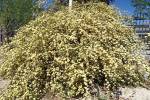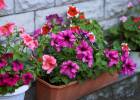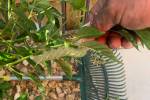Now’s the time to put more blooms on your roses
Roses, a way to almost everyone's heart, are making up for the traditional fall show of color with blooms that will last until Jack Frost paints our valley.
Here's what to do to put more blooms on your roses, as suggested by the Las Vegas Valley Rose Society.
Evaluation time: First, assess your roses.
■ You can't do much about the smaller summer blooms, caused by the heat.
■ Small pale-yellow leaves indicate a need for more nitrogen.
■ Yellow leaves with greenish veins are asking for iron.
■ Sucker growth or vigorous growing canes coming from below the plant's crown must be removed. If you don't, they will consume your desired rose.
■ Scorched leaves indicate a need to improve your watering habits. In most cases, plants are not getting enough water to push away salts in the soil.
■ Rogue out those roses you don't like and plant new ones. They'll be in full production for you next summer.
Groom your roses: Grooming is not pruning, but rather cleaning out bushes for your fall flush of blooms. Here's what to do.
■ Remove all faded flowers. You are not interested in seed production, so focus the plant's energy on fall bloomers.
■ Remove any dead or diseased wood.
■ Crew cut or remove one-third of the rose's top growth.
■ Remove crisscrossing canes blocking sunlight to pass through the bush. The sun nourishes the plant's crown to stimulate more canes.
■ Get rid of all twiggy growth.
■ Make all final cuts flush to another cane. Do not leave any stubs, because they become invitations for pest infestations.
Feeding time: Roses are big eaters, so feed them to guarantee big bloomers.
■ Give plants a deep drink before feeding to flush away any salt buildup and avoid fertilizer burn.
■ Give them an all-purpose rose food by applying the rates recommended on the fertilizer bag. Rose food contains nitrogen to generate lush growth to manufacture more food for bigger blooms; phosphorous stimulates root and flower development and prettier, long-lasting roses; potassium or potash does hidden wonders for roses. It makes them more resistant to pests and more winter hardy.
■ Add bone meal. It is a slow-release form of phosphorous to stimulate roots through the winter.
■ Soil sulfur improves the soil pH and frees up essential nutrients for healthier roses.
■ Epson salts or magnesium sulfate improves the quality of blooms and puts more substance in your blooms.
■ Cottonseed meal or fish emulsion helps to make higher quality blooms. These products are becoming harder to find and expensive because others realize their importance in growing other crops.
■ Scratch nutrients into the top two inches of soil under each bush and follow with a deep irrigation to move nutrients into the rooted area.
■ Make your last feeding around Halloween. Later feedings make roses vulnerable to severe frosts.
Watering: Always give your roses a good, deep soaking before and after each feeding. It's the only way to get rid of salts in your soil.
"Watering is like taking a Tylenol to prevent an upcoming headache," said Dick Jackson of the rose society. "I give my plants their Tylenol (big drink) before feeding and they are less likely to experience fertilizer burn (headache)."
From this point on through the winter, always give roses deep soakings. As winter sets in, put more time between irrigations but continue your deep soakings.
Expect pests: As it cools, expect aphids, spider mites, thrips and powdery mildew.
You'll find aphids on lush growth, spider mites down in the bushes and thrips damaging petals, leaving blotches on them to ruin their appearance. Wash them off with a strong jet of water. If powdery mildew brings on its fuzzy-white spots, stop watering at night. Always water in the morning to control this pest.
LEARNING OPPORTUNITY
Grow vegetables in Las Vegas? You bet! But get your cool-season vegetables (radishes, lettuce, cabbage, onions etc.) in now to ensure success, said master gardener Don Fabbi. Note his reasons:
■ Cooler weather gives you sweeter produce.
■ There are fewer pests.
■ They use less water.
■ You will have fewer plant problems.
■ Veggies take on a desired look.
Plant World Nursery at 5301 W. Charleston Blvd. is sponsoring a talk by Fabbi at 11 a.m. Saturday. He'll cover the pertinent things to know so you'll have a successful garden.
Linn Mills writes a garden column each Sunday. You can reach him at linn.mills@ springspreserve.org or call him at 822-7754.























